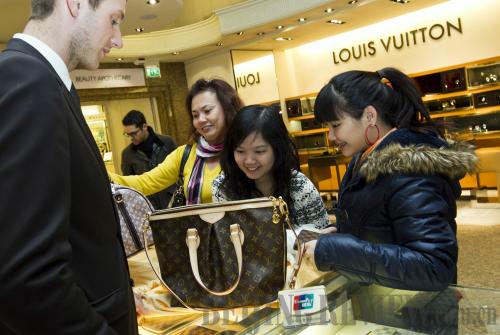|
 |
|
LUXURY SHOPPING: Chinese consumers are buying Louis Vuitton bags in a shopping mall in London on February 3, 2011 (GETTY IMAGES) |
Liu Fei goes to Europe from Beijing twice a year on business. Every time she has a long list of items that her friends ask her to purchase, most of which are luxury brands, such as Louis Vuitton, Gucci and Hermes.
"One day last year, I went directly from the airport to Selfridge in London, the second biggest shopping mall in Britain, for a Prada bag," said Liu. "But, I saw a long Z-shaped line in front of the shopping mall."
Liu found out that all the people waiting in line were there for the 50-percent discount of Gucci. The same long line appeared in London's Westfield, the biggest shopping mall in Europe, and many of the buyers were from China.
"It happens a lot every time I go shopping in Europe," said Liu. "Many of these big brand consumers are from China. Sometimes I even couldn't tell I was actually in Europe."
Younger and younger
When most of the world was in the gloom of the financial crisis in 2008, China's luxury market showed remarkable resilience.
"Since June 2010, 65 percent of the European luxury market was made up of Chinese consumers," said Ouyang Kun, Chief Representative of the World Luxury Association (WLA) Beijing Office. "It is estimated that China's total sales volume of luxury goods will exceed that of Japan and rank as the world's first in a few years."
According to the latest research, the average age of Chinese luxury consumers is 15 years younger than Europe and 25 years younger than the United States. More than half of Chinese consumers are between 25 to 28 and earn about 10,000 yuan ($1,515) every month.
"In 2007, most of the luxury consumers in China were around 35 years old. But now, they are almost 10 years younger," said Ouyang, who regarded the conspicuous consumption of the second generation from rich families as one of the most important reasons for the change.
"They show off the wealth of their families by purchasing luxury goods and their parents are willing to pay for that," said Ouyang.
"When the first generation of rich people in China were called nouveau riche, with the typical image of wearing thick gold chains around their neck and loudly talking into mobile phones, the image of the second generation becomes obviously more international, buying luxury goods all over the world," said Guo Zuli, Director of the World Luxury Research Center affiliated to the WLA Beijing Office.
Saving for luxury
However, research from the center shows there is also a certain number of young luxury consumers that neither come from rich families nor earn a lot of money. They live frugally for months to save for a Louis Vuitton bag or some smaller accessories, such as a pair of Chanel sunglasses or a Prada wallet.
Wang Li, a college teacher in Guangdong Province, earns about 4,000 yuan ($606) a month, but she spent more than 5,000 yuan ($758) on a Louis Vuitton bag. "I just feel good carrying it even in the crowded subway," said Wang.
"The income of this kind of bag-obsessed young women might be too low to afford luxury goods, but they would still save for months to buy a bag to feel like they are a part of the upper class," said Guo. "This kind of consumer actually makes up a pretty high proportion of the luxury goods consumer market in China."
According to Guo, bags, for these buyers, seem to be a sign of social status.
"The purchase of a luxury item is a way to stick a label on themselves, draw them into a certain social circle, and bring them opportunities," said Guo.
Cheng Meiwei, a 28-year-old business woman in Shanghai, has more than 10 Hermes scarves. Every year she sells last year's fashions online and adds some money for new styles.
"It seems like a rule, business partners always judge each other by the brands they use," said Cheng. "And it is better to have some of the latest luxury products, but it is so expensive to keep up on that."
That is why the market for renting luxury goods is also booming in China. | 